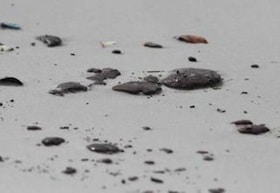Since the very first tar balls began rolling onshore along the Gulf of Mexico following 2010’s Deepwater Horizon oilrig explosion and subsequent underwater oil geyser, the oil industry told us to relax because those tar balls were completely harmless. But as we approach the two year anniversary of the disaster, new studies have confirmed that the tar balls we’re seeing along our beaches contain bacteria that are capable of killing human beings.
The new study, conducted by scientists at Auburn University, confirmed the presence of a bacteria called Vibrio vulnificus. According to researchers, this is the same bacteria that is responsible for causing illness and death from eating bad oysters. The tar balls contained concentrations of this bacteria more than 100 times greater than the surrounding water. The Centers for Disease Control says the following regarding Vibrio vulnificus:
Wound infections may start as redness and swelling at the site of the wound that then can progress to affect the whole body. V. vulnificus typically causes a severe and life-threatening illness characterized by fever and chills, decreased blood pressure (septic shock), and blood-tinged blistering skin lesions (hemorrhagic bullae). Overall, V. vulnificus infections are fatal about 40% of the time. Wound infections with V. vulnificus are fatal about 20% of the time, and aggressive surgical treatment can prevent death.
Persons who have immunocompromising conditions and especially persons with chronic liver disease are particularly at risk for V. vulnificus infection when they eat raw or undercooked seafood, particularly shellfish harvested from the Gulf of Mexico, or if they bathe a cut or scrape in marine waters. About three-quarters of patients with V. vulnificus infections have known underlying hepatic disease or other immunocompromising illness. Otherwise healthy persons are at much lower risk of V. vulnificus infection.
It is important to remember that this isn’t a fleeting threat to those of us who live, work, and play along the Gulf Coast. National Geographic recently pointed out that tarballs are continuously washing up along the coasts of the Gulf of Mexico, meaning that the threat of bacterial infection is not only real, but it is persistent. And with Spring Break season in high gear, beaches along the Gulf Coast are currently inundated with out of state families playing and relaxing on top of these toxic bacteria balls.
And again, we’ve been reassured time and time again from the oil industry, particularly BP, that these tar balls do not pose a single threat to human health.
A recent out of court settlement between the victims of the oil spill and BP provides for medical monitoring – meaning that the company will set aside money to pay for future medical expenses related to their disaster – which is somewhat reassuring for those who are walking on bacteria balls daily. But as temperatures rise along the Gulf Coast, more and more families and children are heading to the beach, not knowing of the toxic threat that is lurking beneath their feet.
Subscribe to our newsletter
Stay up to date with DeSmog news and alerts







